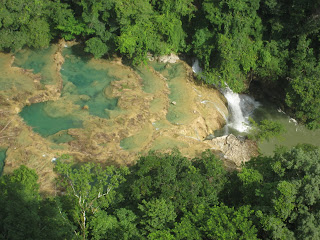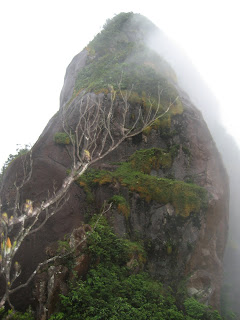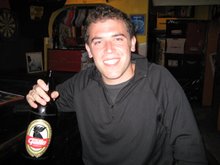By the time I got to Nicaragua, my trip was quickly coming to an end and I had to prioritize. I decided that I couldn't miss an excursion into the jungle on the Mosquito Coast of Honduras. The Mosquitia region covers the entire Northeast of Honduras, including much of the Caribbean Coast. It is populated by a few indigenous peoples, but mostly the Miskito.
I always assumed that the Mosquito Coast was named as such because there were a ton of mosquitoes there. Well, there are plenty of the little buggers; but the region is actually named for this indigenous tribe (although the spelling is confusingly different). Just to add another layer of confusion, the Miskito got their name because they were especially facile with the muskets with which the British armed them in order to fight the Spanish.
The Mosquitia region includes the Rio Platano Biosphere Reserve, a world heritage site with pristine jungle that provides habitat for jaguars, monkeys, crocs, and more. I was hoping to see some dangerous critters.
So, I caught a 4am minibus out of Leon on the bumpiest roads i´ve ever been on; switched buses 2-3 times and arrived in the north-central Honduran town of La Ceiba at 8:30pm. La Ceiba is on the Caribbean Coast and the closest city to the Bay Islands, which has some of the best and cheapest scuba diving in the world. But, given my limited time, I had to skip diving in order to get into the jungle.
After more than 16 hours on the road, I sprung for a hotel with air conditioning and went to find an ATM. I tried at least 8 ATMs, none of which would accept my card. Finally, after walking around the city for 1.5 hours I was able to take out what I thought would be enough money to fund my jungle adventure.
The next morning I decided to get on plane instead of taking a 4 hour bus ride and 3-4 hour ride on back of pick-up on beach in order to reach the Moskitia region. I got to the airline office at 8:30, but the Lonely Planet was out of date and only flight was at 10am to a different locale and costing nearly twice as much as LP said.
I had to make quick decision and decided to jump on the flight (I was very lucky because there are only flights MWF and this was Wed). So, I flew in a puddle jumper from La Ceiba to the town of Brus Laguna with no real plan as to how I would get into the jungle. The LP had recommended setting up a tour in advance, but I hadn't had time to think about it in La Cieba.
Here's my plane:

Luckily, I met two nice guys from the U.S. on the plane, John and Robert, who were hooked up with La Ruta Mosquitia, an indigenous-run collective that arranges tourist trips. A woman named Dorka met them at the ¨airport¨ (a mud strip) and she helped me find a boat to take me to Rio Platano (where I had lunch) and then a car to Reista where I was to ask for a woman named Melisa who would help me find a way up Rio Platano (the river, not the town) to the town of Las Marias.
Here's my ride to Reista:

This was already quite an adventure, but I decided to make it a bit more interesting. While on the boat to Reista I began to realize that the guidebook wasn´t kidding when it said things were expensive around here. I didn´t have nearly enough cash on me to get up the river to Las Marias, take a guided tour of the jungle, eat, and get back to La Ceiba; and there were no ATMs anywhere in this region of the country. I couldn´t accept that I would have arrived here through such trouble and expense only to not be able to get into the jungle, so I started to think about what I had in my bag that I might barter with.
Getting Lucky in ReistaI walked into Reista and found Melisa. She had room to put me up, but told me there were no "collectivos" going up the river. This meant that I would have to hire my own private motor canoe--exactly what I couldn't afford to do in my cash-strapped state.
This is where I was bailed out in a way that would make my mom crazy (but happy for me of course b/c she's my mom). She's always saying how I just roll through life without planning or preparing and things just seem to work out. Well, this was a great example. By all rights I should have been screwed. I hadn't thought through how much money I'd need and now I couldn't afford to do exactly what I came all the way across Central America to do.
But, the fates shined down upon me in the form of Jeffrey. Jeff is a guy from the U.S. who was staying with Melisa and her mother Elma; had already booked a canoe for the next day that I could share; and had even taken out more cash than he needed--so he could lend me money. He was also a cool guy who had just spent a few months chasing iguanas around Latin America.
Here's Jeffrey on the porch of our place in Reista:


So, we chilled out in Reista, played some futbol with the kids, and had a fantastic lobster dinner in Elma's kitchen (see "La Comida Tipica"):

The next morning, Jeffrey and I headed out onto Rio Platano into the jungle and towards the town of Las Marias.

 Las Marias
Las MariasWe arrived upriver in Las Marias and got settled in at Rutila's.


Las Marias' head guide came over to greet us and talk about what jungle tour we wanted to take. The head guide is elected by the members of the community and rotates every year or so.

Meeting the head guide was fascinating because he was incredibly effeminate--in a way that would suggest to most people that he was gay. The fact that he appeared gay and was elected to represent the community to foreign tourists raised a set of fascinating questions.
Was being gay just fine in this community? This seemed unlikely given the state of gay acceptance in Latin America; and given (I later found out) that the guide's father is the local Catholic priest.
Was being gay simply so out of question that no one would even conceive of it no matter how effeminate someone is?
Or, is being effeminate something that we have been culturally conditioned to associate with being gay in the U.S., but is actually totally unrelated--i.e. the strapping football player is just as likely to be gay as the effeminate hair dresser, but the hair dresser is just more likely to be open about it.
I didn't think it was my place to ask the head guide these questions. And, I'll spare y'all my philosophical musings at this point.
Jeff and I settled on the three day tour to Pico Dama, which requires the services of three guides. The next step was to stock up on provisions for our adventure. Our guides were to do all of the cooking, but we were responsible for bringing our own food. Here's the little store where we bought a ridiculous amount of rice, beans, flour, shortening (especially shortening) and snacks for just a few bucks:

I tried to tell the head guide that we would gladly have paid double for the food if the guides would have brought it for us, but he didn't seem to understand that they were missing an opportunity to make more money.
The next morning, we started with a brutally hot hike across the rather large village and then met our guides, Noe, Corbin, and Abelardo at our canoe, which we needed to take further up river. Here are our guides, with Jeffrey:

After these guys busted their butts pushing us up the shallow river in our canoe, we began a pretty tough hike uphill into the jungle towards our cabana. Here are some shots from that first day's hike:


Our head guide had us moving at a brisk pace, so after a pretty tough (and hot) walk, we made it to the cabana in just a few hours. I'm not an experienced hiker, but this was the toughest hike I'd ever done. Here's what our new home looked like:

This guy was hanging out right near our cabana:

We were all so exhausted that we ate dinner at about 4:30 and were in bed by around 6pm. The next day we'd set out on the coolest hike I've ever done.
To Pico DamaWe woke up early (not hard after going to bed at 6) and made some breakfast:

Then we got an early start on the way up to our destination. This ended up being a combination hike and mountain climb. We had to work our way up through thick forest at steep angles.








Here we are at the peak:




And, here's a view of the Rio Platano (the river we traveled up to reach Las Marias and Pico Dama):
 Heading Back to the Modern World
Heading Back to the Modern WorldThe next morning we hiked back to the canoe, and got to Las Marias in time to make the trip back to Raista. We spent the night with Elma and then headed our early the next morning to get back towards Guatemala. Here's the sunrise we saw as we took a canoe out of Raista:

Instead of taking a plane, this time we hopped into one of the 4x4s that drive supplies (and people) into the various villages along the beach. Here we are on the back of the truck, driving down the beach:

They had rigged up a crazy raft system to get the trucks through some wet parts on the beach. They actually drove the trucks up onto the rafts and then pulled them across using ropes anchored on each side:


While I didn't see any jaguars, the trip was a fascinating experience both naturally and culturally. Our guides were cool guys and Noe was pretty talkative and engaged.
One of the most interesting experiences was trying to teach them a card game. I would have thought that these guys would play a lot of cards in their village since they don't have electricity to distract them in their downtime. But, they said they pretty much only play with tourists. It was pretty much impossible to teach them a relatively simple game. I think this is because the concept is so foreign to them and their education was so fundamentally different than ours.
Adam, a thoughtful Arizonian (in spite of being a Republican--only the second or third I'd met on my trip, and he was Jewish!) Jeff and I met in Las Marias (he's the guy on the truck with me above) suggested that perhaps the very concept of playing a game to occupy one's mind when you might otherwise be bored is not within their experience. So, they might not only have been thinking "how do I do this," but "why am I doing this silly thing."
Bottom line--the trip was well worth the difficult (but sometimes fun) travel it required. Also, I was even luckier than I realized. It turned out that a major hurricane was expected to hit Honduras while I was in the jungle. The folks in the coastal village thought we were screwed staying in the wooden cabana pictured above. Much of Honduras had been devastated by Hurricane Mitch in 1998. But, the storm touched down to the north and missed Honduras all together...and I emerged unscathed.





























































